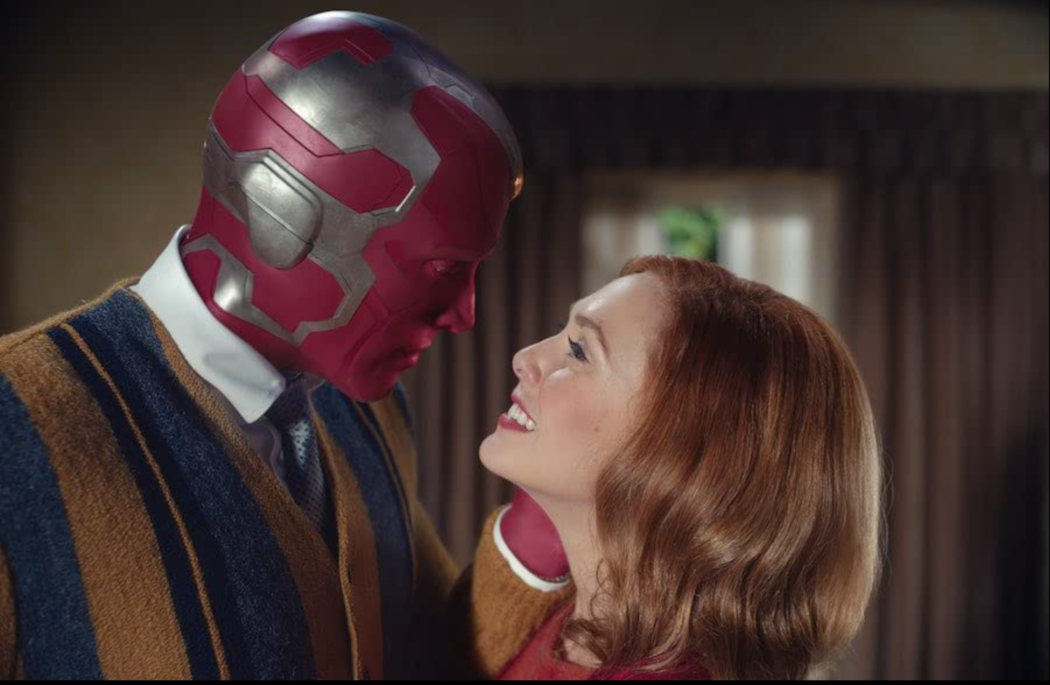Opinion: ‘WandaVision’ will change the MCU forever
Editor’s note: Spoilers ahead!
On Jan. 15, we were introduced to a new era of Marvel content with the release of “WandaVision,” the sitcom-y series about Wanda Maximoff and Vision after the events of “Avengers: Endgame.” Wanda, portrayed by Elizabeth Olsen, and Vision, played by Paul Bettany, live their black and white, televised life within a simpler and happier version of their future.
Wanda, now donning her iconic Scarlet Witch title, design and name, works to make the MCU a darker place, setting the bar high for future MCU shows, while setting up the events and development of future films, team-ups and characters. Creepier, more fantastical, and magic-based heroes and storylines will surely begin to appear in future projects.
In one scene, we see Agatha Harkness sucking the life force out of other witches until they’re shriveled mummies. That’s pretty creepy for a Marvel show. In another scene, innocent people are begging to die after experiencing excessive psychological torture. Then we see government agents try to shoot children. Things will only become more intense as the entire franchise matures and grows.
As Wanda has become more powerful, she could even become a villain or true anti-hero. As a whole, the series is filled with Marvel’s well-formulated action-comedy routine, dark undertones, and themes of grief, family, and sacrifice that work to humanize Wanda, even with her menacing powers.
In an article for NPR, Linda Holmes writes, “It’s unlikely that this show, with this focus, could ever have been successful without Elizabeth Olsen’s indelible central performance.” Jen Chaney, for The Vulture, wrote about how various pieces of the series fit together perfectly, writing, “That clever premise puts “WandaVision” in several categories at once: a comedy and a mystery, a superhero story and a period-piece spoof.”
Fans and critics adored the series, giving it an 8.2 on IMDB and 91% on Rotten Tomatoes. But what effect will the series have within the MCU?
We know that Wanda will join the cast of the upcoming film “Dr. Strange in the Multiverse of Madness,” so the effects of the series will likely play into the magical aspect of the film. According to a video review by IGN, it states, Dr. Strange’s second film will feature horrific elements, inspired only by the frightful themes from “WandaVision.” It can only be inferred that the series will inspire the dark nature of this upcoming film, as well as others.
Wanda’s children Billy and Tommy, or Wiccan and Speed, are some of the key members of the Young Avengers team, and may possibly set up the new group of heroes, carrying the mantle of the original Avengers.
Wiccan/Billy is a gay character in the comics, so his future appearances are especially important for the setup of LGBTQ characters in the MCU. This is a big push for representation on Marvel’s part, but we may not see anything until Billy is a teenager and eventually paired up with his comic-book partner, Hulkling.
With the show’s success, a lot of pressure is on the future Disney+ original Marvel shows, such as the upcoming “Falcon and the Winter Soldier” and “Loki,” as well as “Hawkeye,” “What If…?,” and “Ms. Marvel.” These shows feature legacy characters and alternative stories and adventures that will all have been affected by “Endgame.” Most of the newer series have large shoes to fill and higher expectations to meet as they follow up “WandaVision.” The show may have been a journey more focused on personal growth for Wanda, but the power she accumulated will not go unnoticed by the world and its heroes.
Wanda could make appearances in future MCU movies and shows before her major role in the new Dr. Strange film, as well as White Vision. Her children and White Vision are presumed to return to the screen, but only time will tell.
Future projects will hopefully learn from the success of WandaVision and try to copy the mature elements and brilliant writing that use human emotion to drive the plot. The series is well worth the watch, and one of the best pieces of Marvel content to date, teaching us lessons about the characters we love, and the development of free will and emotions within ourselves.

Megan Cowdell is a freshman opinion columnist studying for a bachelor’s in Communications. She loves music, reading and wants to write books for a living.
megan.cowdell@usu.edu

